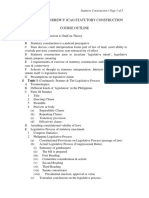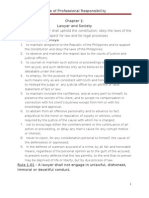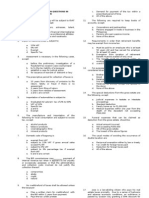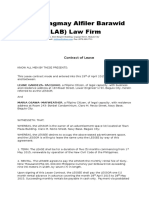0 ratings0% found this document useful (0 votes)
167 viewsWhat Is Legal Counseling
What Is Legal Counseling
Uploaded by
Paolo Sison GoLegal counseling is important in a law course as it involves advising clients on legal problems and appropriate remedies. After passing the bar exam, an attorney has several options - solo private practice if they have experience, joining a private law firm as an associate, working in a corporate law department, or government employment. Setting up a law office requires choosing an accessible location, arranging a neat office with law books, filing systems, and staff. When interviewing a client, the attorney should establish the relationship, determine facts, be frank yet avoid interruptions, take written statements, and advise on settlement options. Billing a client considers the case complexity, time and effort required, court appearances, unexpected motions, and appeal costs if needed. Alternative
Copyright:
© All Rights Reserved
Available Formats
Download as DOCX, PDF, TXT or read online from Scribd
What Is Legal Counseling
What Is Legal Counseling
Uploaded by
Paolo Sison Go0 ratings0% found this document useful (0 votes)
167 views2 pagesLegal counseling is important in a law course as it involves advising clients on legal problems and appropriate remedies. After passing the bar exam, an attorney has several options - solo private practice if they have experience, joining a private law firm as an associate, working in a corporate law department, or government employment. Setting up a law office requires choosing an accessible location, arranging a neat office with law books, filing systems, and staff. When interviewing a client, the attorney should establish the relationship, determine facts, be frank yet avoid interruptions, take written statements, and advise on settlement options. Billing a client considers the case complexity, time and effort required, court appearances, unexpected motions, and appeal costs if needed. Alternative
Original Description:
legal counseling
Original Title
what is legal counseling
Copyright
© © All Rights Reserved
Available Formats
DOCX, PDF, TXT or read online from Scribd
Share this document
Did you find this document useful?
Is this content inappropriate?
Legal counseling is important in a law course as it involves advising clients on legal problems and appropriate remedies. After passing the bar exam, an attorney has several options - solo private practice if they have experience, joining a private law firm as an associate, working in a corporate law department, or government employment. Setting up a law office requires choosing an accessible location, arranging a neat office with law books, filing systems, and staff. When interviewing a client, the attorney should establish the relationship, determine facts, be frank yet avoid interruptions, take written statements, and advise on settlement options. Billing a client considers the case complexity, time and effort required, court appearances, unexpected motions, and appeal costs if needed. Alternative
Copyright:
© All Rights Reserved
Available Formats
Download as DOCX, PDF, TXT or read online from Scribd
Download as docx, pdf, or txt
0 ratings0% found this document useful (0 votes)
167 views2 pagesWhat Is Legal Counseling
What Is Legal Counseling
Uploaded by
Paolo Sison GoLegal counseling is important in a law course as it involves advising clients on legal problems and appropriate remedies. After passing the bar exam, an attorney has several options - solo private practice if they have experience, joining a private law firm as an associate, working in a corporate law department, or government employment. Setting up a law office requires choosing an accessible location, arranging a neat office with law books, filing systems, and staff. When interviewing a client, the attorney should establish the relationship, determine facts, be frank yet avoid interruptions, take written statements, and advise on settlement options. Billing a client considers the case complexity, time and effort required, court appearances, unexpected motions, and appeal costs if needed. Alternative
Copyright:
© All Rights Reserved
Available Formats
Download as DOCX, PDF, TXT or read online from Scribd
Download as docx, pdf, or txt
You are on page 1of 2
1.) What is legal counseling?
Do you find it important as a subject in the study of
the law course? Explain.
Is the art of giving advice and information concerning the solution of a legal
problem arising from a given state of facts and the adoption of appropriate reliefs or
remedies under the law for the satisfaction and enforcement of a legal obligation
before a judicial or quasi-judicial body.
2.) Enumerate the factors necessary under the following:
a. Deciding on what path to take after passing the bar exams.
i. Solo private practice if one has undergone undergraduate legal
aid training or apprenticeship with a private law firm before.
Usually if from the province.
ii. Assistant or associate In a private law firm organizing one with
classmates or joining a law firm with some familiar friends
iii. Joining a corporate law department high immediate salary, to
gain experience and training
iv. Government employment previously in the government,
b. How to put up a law office
i. Location within the busy districts, accessible to transportation,
has parking space
ii. Neat office, proper arrangement, reception rooms other luxuries
if you can afford
iii. Law books at the law firm
iv. Library. Good office, equipment, billing and books, staff polite
etc,
v. Good filing system
c. How to interview a client
i. Establish items of a atty-client relationship
1. Lawyer entitled to atty fees
2. Client cannot dismiss lawyer at will
ii. Determine the facts of the case put him at ease, tell him you
are his friend who will stand by him, he has to tell the truth to
you,
iii. Be frank to the client
iv. Avoid frequent interruptions
v. Conduct your interview in the language that the witness speaks
vi. Reduce to writing narration of witness at end
vii. Interview all available witnesses
viii. Determine clients needs and priorities
ix. Tell the client amicable settlement is the best policy
x. Determine the elements of potential claims, defenses, remedies
and counterclaims
d. How much to bill a client
i. Nature of the case involved
ii. Difficulty and intricacy of the legal issues as compared to
simpler cases
iii. Time and effort to be invested in drafting of the pleadings to the
commencement of the litigation in court, the projected and
number of court appearance up to its termination in the trial
court
iv. Other unexpected incidents like filing and arguing a motion, the
estimated time and effort to be spent for argumentation
v. In case of appeal, the expenses to be incurred in perfecting and
appeal, preparation of appeal briefs, and additional amount of
atty fees for the purpose of appeal
vi. Should include transpo and representation expenses which
should be specified as a separate item and payable only a day
before the day of hearing, specifying the amount that the client
is supposed to pay per appearance in court.
3.) Discuss briefly the Alternative Dispute Resolution and when it is used.
It is any process or procedure used to resolve a dispute or controversy, other than
by adjudication of a presiding judge of a court or an officer of a government agency,
in which a neutral third party participates to assist in the resolution of issues, which
includes arbitration, mediation, conciliation, early neutral evaluation, mini- trial or
any combination.
Usually used, when two disagreeing parties come to an agreement short of
litigation.
You might also like
- Family Law OutlineDocument51 pagesFamily Law OutlineTianna Gadbaw100% (1)
- Legal CounselingDocument1 pageLegal CounselingramilflecoNo ratings yet
- In Re Petition To Sign in The Roll of Attorneys Michael A. Medado, B.M. No. 2540, Sept. 24, 2013Document5 pagesIn Re Petition To Sign in The Roll of Attorneys Michael A. Medado, B.M. No. 2540, Sept. 24, 2013Martin SNo ratings yet
- Public International Law Books - Rex Book Store - Rex E-Store Isagani Cruz - CentralbooksDocument1 pagePublic International Law Books - Rex Book Store - Rex E-Store Isagani Cruz - CentralbooksLylanie Alexandria Yan GalaNo ratings yet
- Atty. Ilagan NotesDocument3 pagesAtty. Ilagan NotesAleah LS KimNo ratings yet
- Problem Areas in Legal Ethics Case DigestsDocument30 pagesProblem Areas in Legal Ethics Case DigestsEqui Tin100% (1)
- Canon 3Document11 pagesCanon 3xxxxxxxxx xxxxxxxNo ratings yet
- 04-08.surigao Mineral Reservation Board v. CloribelDocument15 pages04-08.surigao Mineral Reservation Board v. CloribelOdette JumaoasNo ratings yet
- 06 TOM-new-11 Corporation and SRC Notes - PagesDocument160 pages06 TOM-new-11 Corporation and SRC Notes - PagesClaire Margarette M. Bona0% (1)
- Adoption Inter-Country and Domestic Adoption PhilippinesDocument7 pagesAdoption Inter-Country and Domestic Adoption PhilippinesAlpha BetaNo ratings yet
- 1 Churchill v. ConcepcionDocument7 pages1 Churchill v. ConcepcionJoan Dela CruzNo ratings yet
- Pale SyllabusDocument23 pagesPale SyllabusCyrus DaitNo ratings yet
- Tax 2 Reviewer LectureDocument12 pagesTax 2 Reviewer LectureHazel Rocafort TitularNo ratings yet
- Petitioner-Appellant Administratrix-Appellant Vs Vs Oppositor-Appellee Juan S. Rustia, Peralta & AgravaDocument4 pagesPetitioner-Appellant Administratrix-Appellant Vs Vs Oppositor-Appellee Juan S. Rustia, Peralta & AgravaDahlia Claudine May PerralNo ratings yet
- A Synopsis: Legal LogicDocument8 pagesA Synopsis: Legal LogicJoan PabloNo ratings yet
- Pub Corp Full Cases First BatchDocument203 pagesPub Corp Full Cases First BatchJCapskyNo ratings yet
- BM No. 2265: Reforms in The 2011 Philippine Bar Exam (Bar Examinations Were Moved From September 2011 To November 2011)Document5 pagesBM No. 2265: Reforms in The 2011 Philippine Bar Exam (Bar Examinations Were Moved From September 2011 To November 2011)Frederick GellaNo ratings yet
- In The Matter of The Petitions For Admission To The BarDocument52 pagesIn The Matter of The Petitions For Admission To The BarGwenBañariaNo ratings yet
- Penilla vs. Alcid JR A.C. No. 9149 September 04, 2013Document1 pagePenilla vs. Alcid JR A.C. No. 9149 September 04, 2013Markus Tran MoraldeNo ratings yet
- Sctions 8, 30 and 36 of The Revised Securities Act Do Not Require The Enactment of Implementing Rules To Make Them Binding and EffectiveDocument2 pagesSctions 8, 30 and 36 of The Revised Securities Act Do Not Require The Enactment of Implementing Rules To Make Them Binding and Effectiveambet amboyNo ratings yet
- L ETHICS Villanueva G R No L 19450 DigestDocument1 pageL ETHICS Villanueva G R No L 19450 DigestAR Ivle0% (1)
- Civil Procedure Notes - Cha MendozaDocument30 pagesCivil Procedure Notes - Cha Mendozacmv mendozaNo ratings yet
- Atty. Alex Andrew P. Icao Statutory Construction Course OutlineDocument5 pagesAtty. Alex Andrew P. Icao Statutory Construction Course OutlineKaren K. GaliciaNo ratings yet
- 14 PACULDO V CADocument2 pages14 PACULDO V CAJulius ManaloNo ratings yet
- (D Asia Power PointDocument42 pages(D Asia Power PointJoe Belarmino IINo ratings yet
- Bar Questions and Answers (Political Law)Document81 pagesBar Questions and Answers (Political Law)Kate EvangelistaNo ratings yet
- Basic Legal Ethics: I. Definition SourcesDocument16 pagesBasic Legal Ethics: I. Definition SourcesKim MoritNo ratings yet
- Case Digest de Guzman V. de DiosA.C. No. 4943. January 26, 2001Document2 pagesCase Digest de Guzman V. de DiosA.C. No. 4943. January 26, 2001Daniel Dela CruzNo ratings yet
- A.M. No. 07-11-08-SC (Special Rules of Court On Alternative Dispute Resolution)Document31 pagesA.M. No. 07-11-08-SC (Special Rules of Court On Alternative Dispute Resolution)Denise CruzNo ratings yet
- Demand Letter - Dr. Golea - Logan JR 3 1 22Document1 pageDemand Letter - Dr. Golea - Logan JR 3 1 22MJane PerezNo ratings yet
- Digest - Dinglasan V Ang ChiaDocument2 pagesDigest - Dinglasan V Ang ChiaamberspanktowerNo ratings yet
- Atty. Allan F. Paguia v. Atty. Molina, A.C. No. 9881, June 4, 2014Document3 pagesAtty. Allan F. Paguia v. Atty. Molina, A.C. No. 9881, June 4, 2014Pamela TambaloNo ratings yet
- Legal Ethics Chapter I - Lawyer and SocietyDocument37 pagesLegal Ethics Chapter I - Lawyer and SocietyAaliyah Andrea100% (1)
- Canon 7Document14 pagesCanon 7AnneNo ratings yet
- Rule 138 A AM 19 03 24 SC Sec 4 5Document1 pageRule 138 A AM 19 03 24 SC Sec 4 5PJFilm-ElijahNo ratings yet
- Case No. 1 Cayetano vs. Monsod 201 SCRA 210 September 1991: FactsDocument2 pagesCase No. 1 Cayetano vs. Monsod 201 SCRA 210 September 1991: FactsJohn Will S. PatarlasNo ratings yet
- Cerilla V LezamaDocument1 pageCerilla V LezamaChristian Delos ReyesNo ratings yet
- De Castro-Remedial LawDocument37 pagesDe Castro-Remedial Lawlucasferna123No ratings yet
- Betty Gabionza and Isabelita Tan vs. Court of Appeals GR No. 161057 September 12, 2008 FactsDocument24 pagesBetty Gabionza and Isabelita Tan vs. Court of Appeals GR No. 161057 September 12, 2008 Factsdwight yuNo ratings yet
- Canon IV, Section 8Document12 pagesCanon IV, Section 8Ridmd TresNo ratings yet
- Assignment Pale Summer ClassDocument8 pagesAssignment Pale Summer ClassYanaKarununganNo ratings yet
- Case Brief - ADRDocument15 pagesCase Brief - ADRHanna AyonNo ratings yet
- Mirror and Curtain PrincipleDocument1 pageMirror and Curtain PrincipleFarra FattahNo ratings yet
- Code of Professional ResponsibilityDocument6 pagesCode of Professional ResponsibilityRoni TapeñoNo ratings yet
- Pale HW2Document27 pagesPale HW2Celiña PerezNo ratings yet
- ECodal - A.M. No. 05-11-04-SC - Rules of Procedure in Cases of Civil ForfeitureDocument22 pagesECodal - A.M. No. 05-11-04-SC - Rules of Procedure in Cases of Civil ForfeitureJerome RinonNo ratings yet
- LEGAL FORMS - Laquindanum v. Quintana (A.C. No. 7036)Document3 pagesLEGAL FORMS - Laquindanum v. Quintana (A.C. No. 7036)Togle Clarence100% (1)
- AbcDocument3 pagesAbcPia Sotto100% (1)
- Aklat Asosasyon Vs COMELECDocument11 pagesAklat Asosasyon Vs COMELECAsHervea AbanteNo ratings yet
- Osted BY Achel HAN IN ASE Igests Onstitutional AWDocument32 pagesOsted BY Achel HAN IN ASE Igests Onstitutional AWPrincess Hazel GriñoNo ratings yet
- Juasing Hardware v. MendozaDocument1 pageJuasing Hardware v. Mendozad2015memberNo ratings yet
- Taxation Mock Bar..Document11 pagesTaxation Mock Bar..Arl RuthNo ratings yet
- In Re Undated Letter of MR Louis C BiraogoDocument2 pagesIn Re Undated Letter of MR Louis C BiraogoAngelina Villaver ReojaNo ratings yet
- Article 1825 ReportDocument2 pagesArticle 1825 Report06675354d100% (1)
- Basic Legal EthicsDocument3 pagesBasic Legal EthicsMary Jane PoloNo ratings yet
- Vitriolo Vs DasigDocument3 pagesVitriolo Vs DasigAlyssa joy TorioNo ratings yet
- Mejia vs. Reyes, 4 SCRA 648Document3 pagesMejia vs. Reyes, 4 SCRA 648Doo RaNo ratings yet
- LEGAL ETHICS IN THE 21ST CENTURY - Dean DukaDocument11 pagesLEGAL ETHICS IN THE 21ST CENTURY - Dean DukaRobert F Catolico IINo ratings yet
- Legal CounselingDocument2 pagesLegal CounselingElaineFaloFallarcunaNo ratings yet
- Cpra 2023Document76 pagesCpra 2023Grace RoqueNo ratings yet
- Chapter IiDocument2 pagesChapter IiIrish CPNo ratings yet
- Nego Reviewer Dean SundiangDocument29 pagesNego Reviewer Dean SundiangPaolo Sison GoNo ratings yet
- Digest Author: Paolo GoDocument1 pageDigest Author: Paolo GoPaolo Sison GoNo ratings yet
- REYES Bar Reviewer On Taxation II (v.3)Document164 pagesREYES Bar Reviewer On Taxation II (v.3)Glory Be93% (14)
- Election Law CasesDocument322 pagesElection Law CasesPaolo Sison GoNo ratings yet
- Yu Vs YuDocument2 pagesYu Vs YuPaolo Sison GoNo ratings yet
- De Guzman V. CADocument1 pageDe Guzman V. CAPaolo Sison GoNo ratings yet
- Astorga vs. VillegasDocument2 pagesAstorga vs. VillegasPaolo Sison GoNo ratings yet
- Labo Vs ComelecDocument2 pagesLabo Vs ComelecPaolo Sison GoNo ratings yet
- Meralco v. Castro-BartolomeDocument2 pagesMeralco v. Castro-BartolomePaolo Sison GoNo ratings yet
- Joya vs. Presidential Commission On Good GovernmentDocument3 pagesJoya vs. Presidential Commission On Good GovernmentPaolo Sison GoNo ratings yet
- Director of Lands v. Intermediate Appellate CourtDocument2 pagesDirector of Lands v. Intermediate Appellate CourtPaolo Sison Go100% (5)
- State Investment House V CADocument3 pagesState Investment House V CAZoe VelascoNo ratings yet
- Roy H. Peoples v. Elliott L. Richardson, Secretary of Health, Education and Welfare, 455 F.2d 924, 4th Cir. (1972)Document3 pagesRoy H. Peoples v. Elliott L. Richardson, Secretary of Health, Education and Welfare, 455 F.2d 924, 4th Cir. (1972)Scribd Government DocsNo ratings yet
- Project For PracCourt 1Document2 pagesProject For PracCourt 1Prime Antonio RamosNo ratings yet
- Failure To Declare Jurisdiction Early Is FatalDocument8 pagesFailure To Declare Jurisdiction Early Is FatalPublic Knowledge100% (10)
- Malabanan vs. Ramento PDFDocument2 pagesMalabanan vs. Ramento PDFKJPL_1987100% (1)
- Energy Automation Systems, Inc. v. Xcentric Ventures, LLC Et Al - Document No. 8Document1 pageEnergy Automation Systems, Inc. v. Xcentric Ventures, LLC Et Al - Document No. 8Justia.comNo ratings yet
- Personal and Confidential Privileged Offer To CompromiseDocument11 pagesPersonal and Confidential Privileged Offer To CompromiseAdam JustinoNo ratings yet
- ESTA CODE Govt. of PakistanDocument421 pagesESTA CODE Govt. of Pakistanhimat_22No ratings yet
- A Review On: Criminal EvidenceDocument77 pagesA Review On: Criminal EvidenceAntonet CabtalanNo ratings yet
- Spectrum Diversified Designs v. Argento SC by Sicura - ComplaintDocument24 pagesSpectrum Diversified Designs v. Argento SC by Sicura - ComplaintSarah BursteinNo ratings yet
- Nii Kpobi Tettey Tsuru Iii & Ors. VRS Agric Cattle & OrsDocument13 pagesNii Kpobi Tettey Tsuru Iii & Ors. VRS Agric Cattle & OrsYaa Obenewaa AcheampongNo ratings yet
- CREBA V Secretary of Agrarian Reform GR No 183409 06-18-2010Document9 pagesCREBA V Secretary of Agrarian Reform GR No 183409 06-18-2010Tokie TokiNo ratings yet
- Facto Convert It Into Patrimonial Property. While A Prior Declaration That TheDocument17 pagesFacto Convert It Into Patrimonial Property. While A Prior Declaration That TheThereseVilogNo ratings yet
- Tan Vs Standard Vacuum Oil Co.Document2 pagesTan Vs Standard Vacuum Oil Co.Tricia Sibal100% (1)
- Department of Labor and Employment: Republic of The PhilippinesDocument5 pagesDepartment of Labor and Employment: Republic of The PhilippinesVanessa ReynosoNo ratings yet
- Case SlidesDocument8 pagesCase SlidesAnushka ChauhanNo ratings yet
- Katarungang PambarangayDocument7 pagesKatarungang PambarangayMark VernonNo ratings yet
- Dealer AgreementDocument12 pagesDealer AgreementJmchae100% (2)
- DAVID, Et Al. VS., ARROYO, Et AlDocument43 pagesDAVID, Et Al. VS., ARROYO, Et AlAldrinmarkquintanaNo ratings yet
- Valve Body Recalibration Kit ALLISON 1000 Series LBZ/LMM: 2006 - 2010 Installation GuideDocument8 pagesValve Body Recalibration Kit ALLISON 1000 Series LBZ/LMM: 2006 - 2010 Installation GuideLopez AdrianNo ratings yet
- 33-2 Settlement AgreementDocument103 pages33-2 Settlement AgreementJohana Bhuiyan100% (1)
- ADR Course Outline 2021Document4 pagesADR Course Outline 2021rishav kumarNo ratings yet
- Civil Suit 8 of 2020Document12 pagesCivil Suit 8 of 2020wanyamaNo ratings yet
- THE CITY OF DAVAO, REPRESENTED BY THE CITY TREASURER OF DAVAO CITY, Petitioner, v.THE INTESTATE ESTATE OF AMADO S. DALISAY, REPRESENTED BY SPECIAL ADMINISTRATOR ATTY. NICASIO B. PADERNA, Respondent.Document8 pagesTHE CITY OF DAVAO, REPRESENTED BY THE CITY TREASURER OF DAVAO CITY, Petitioner, v.THE INTESTATE ESTATE OF AMADO S. DALISAY, REPRESENTED BY SPECIAL ADMINISTRATOR ATTY. NICASIO B. PADERNA, Respondent.Pame PameNo ratings yet
- Equity Has Precedence Over The Common LawDocument11 pagesEquity Has Precedence Over The Common LawNuwaha Ozius100% (3)
- Black-Clawson International Ltd. AppellantsDocument63 pagesBlack-Clawson International Ltd. AppellantsOkeeto DaSilvaNo ratings yet
- Abril Lagmay Alfiler Barawid (ALAB) Law Firm: Contract of LeaseDocument3 pagesAbril Lagmay Alfiler Barawid (ALAB) Law Firm: Contract of LeaseStephen MallariNo ratings yet
- AHA Consulting Agreement With Patrice McGinnDocument7 pagesAHA Consulting Agreement With Patrice McGinnopenlineblogNo ratings yet
- Administrative Appeals TribunalDocument83 pagesAdministrative Appeals TribunaladilshahkazmiNo ratings yet




































































































